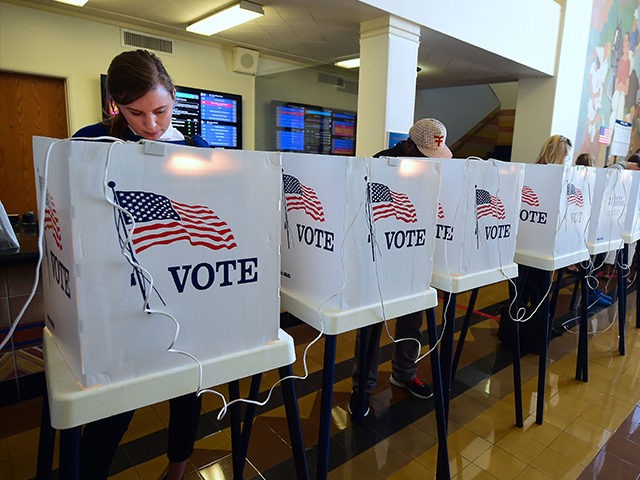On Thursday’s Breitbart News Daily, Prof. John Banzhaf of the George Washington University School of Law, who provided early and consistent warnings that the American election system is vulnerable to hacker attack, discussed the Department of Homeland Security’s disturbing admission that hackers targeted 21 states during the 2016 election.
Banzhaf said the news has yet to bring him apologies from those who dismissed his warnings as groundless conspiracy theories before the election.
“These were not just suggestions or polite warnings. What I wrote on Breitbart is, ‘Warning: this presidential election could be hacked, perhaps by a foreign power! A hacker with off-the-shelf malware can steal more votes than any corrupt politician!’” he said of his efforts to highlight the hacking threat.
“There were a half-dozen by me. There were dozens of others,” he recalled. “Not only were they ignored, but government officials actually came on and ridiculed them. They said, “Oh, it couldn’t possibly happen.’ And they gave crazy explanations. They said, ‘Oh, it can’t happen because we have the Electoral College. We have diversity. We have all these different voting precincts.’”
“It now appears, of course, and this is based upon my calculations, that it’s easier to influence the election under the Electoral College than it would be if we had direct elections,” he contended.
Banzhaf further argued that we still do not know exactly how many hacking attempts were launched against the electoral system.
“They said that they’ve now detected 21. Three other major news outlets have reported that the number is closer to 39. One of the things we know about hacking is if you are a successful hacker, they never find out if you changed. So we know, whether the number is 21 or 39, that they didn’t target this number. They were successful in a number of situations in getting in. We don’t know how many they got in, as compared with simply ‘targeting.’ Even that phrase is a little bit unclear. But if they were good and if they were successful, we wouldn’t know,” he said.
“Oh, and by the way, would they tell us?” he added. “Just suppose for a minute that they now had evidence that in two or three key states, somebody – we now know it’s the Russians – could have changed enough votes to change the outcome of the election. Do you think they’re going to come out now and say that?”
“Remember the testimony yesterday. They didn’t want to reveal the risk of hacking because they didn’t want people to lose confidence in the electoral process. Well, if you come out now and say, ‘Hey, maybe Trump is legitimate, maybe not, we don’t know’ – I don’t think they’re ever going to say that, even if they knew it,” he argued.
Banzhaf said it was known long before the election that at least two states had been hacked.
“Now, I pointed out that they used COTS, which is common off-the-shelf hacking tools. I even named some of the programs and some of the places where anybody, some high-school kid could go and download a program which would allow them to hack. And still, it was ignored,” he lamented.
“Perhaps more importantly, I suggested – and others suggested; I wasn’t the only one – there were things that we could do, and we probably, at this point, should be seriously considering doing them, to prevent this kind of hacking,” he continued.
“For example, there are a lot of voting machines out there which do not provide what we call a paper trail or audit credibility. In other words, we can’t go back and track it. We can’t test it. So you’ve heard the old expression ‘garbage in, garbage out?’ Well, with these systems, it could be ‘mystery in, mystery out.’ We have no way of checking what they’re doing,” he warned.
“There are people who have shown that in systems that use voting cards, you get a little card like a credit card, and you stick it into the machine. A hacker can reprogram that credit card so when he goes into that voting booth, puts the card in and pushes a button, instead of one vote for Hillary or for Donald, it becomes a hundred votes for Hillary or for Donald,” he said.
“Increasingly, we have computers on the Internet, and one thing we all know now for sure is that if any computer, any data processing device is on the Internet, it can be hacked,” Banzhaf pointed out. “They’ve hacked the Pentagon. They hacked Sony. They’ve hacked many major corporations. If they can hack the Pentagon and Sony, are you going to tell me they can’t hack some little system off there in Chicago or something in the boondocks of Kansas?”
“These are things we ought to be seriously considering,” he advised. “Also, of course, more periodic testing, having some system where these computer systems and voting systems, electoral systems in the various states are periodically tested for problems and leaks, and then presumably corrective action is taken.”
“Today, it’s largely up to the local officials – some might say the local yokels. And again, they’re not as sophisticated as the Pentagon,” he noted.
Breitbart News Daily airs on SiriusXM Patriot 125 weekdays from 6:00 a.m. to 9:00 a.m. Eastern.

COMMENTS
Please let us know if you're having issues with commenting.